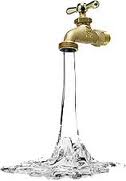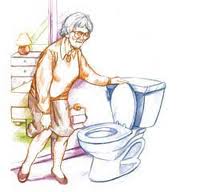Urinary incontinence is defined as "a condition in which there is
an involuntary loss of urine through the urethra enough to constitute a social
problem / physician." This is a symptom-heterogeneous problem is common in
elderly. Their presence in the person produces multiple psychological and
social problems because it has been shown that always helps: promote social
isolation, mental disorders, skin abrasions or urinary tract infections, and is
a common reason for admission to institutions.
 In my short experience, I have seen that urinary incontinence is one of
the causes of self-marginalization in the elderly. For the person aware of
their urinary incontinence, shame, loss of self-esteem and finally, dependence,
are unavoidable steps. Even many families are able to care for their elderly
until incontinence appears, then seeks to institutionalize the elderly because
becomes a major hassle.
In my short experience, I have seen that urinary incontinence is one of
the causes of self-marginalization in the elderly. For the person aware of
their urinary incontinence, shame, loss of self-esteem and finally, dependence,
are unavoidable steps. Even many families are able to care for their elderly
until incontinence appears, then seeks to institutionalize the elderly because
becomes a major hassle.
Aging itself is not a cause of urinary incontinence, however, some
changes associated with age and the highest prevalence of certain diseases
predispose to its development.
 Urinary incontinence has a negative impact on the elderly who suffers
significant impairment in their quality of life, causing multiple repercussions
that affect both the physical realm as well as derive important psychic and
socioeconomic consequences. It is also associated with perineal erythema,
pressure ulcers, urinary tract infections, falls and fractures. I was struck by
the fact that currently holds that urinary incontinence may be an early marker
of fragility and increased risk of mortality. Multiple studies have also been
shown the impact of urinary incontinence in the quality of life, associating
also depression and anxiety.
Urinary incontinence has a negative impact on the elderly who suffers
significant impairment in their quality of life, causing multiple repercussions
that affect both the physical realm as well as derive important psychic and
socioeconomic consequences. It is also associated with perineal erythema,
pressure ulcers, urinary tract infections, falls and fractures. I was struck by
the fact that currently holds that urinary incontinence may be an early marker
of fragility and increased risk of mortality. Multiple studies have also been
shown the impact of urinary incontinence in the quality of life, associating
also depression and anxiety.
For treatment, a nurse should recommend behavior change habits or
perineal rehabilitation, because with these typically get positive results. Here's
an important role nursing through standards and education boards, narrow serial
controls, help exercises, etc.Only if you have not managed to control
urination, is often used to drug therapy and / or surgery.
For all the comment, I think that urinary incontinence is a condition
that a nurse must know very well, as it is a widespread problem that will face
throughout the career. It is essential to know everything that involves the
incontinent patient, including the impact the disease has on the psychosocial
field and the quality of life of elderly.
Bibliography.
- Martínez Gallardo et al. Incontinencia urinaria en el adulto mayorRev Med Inst Mex Seguro Soc 2007; 45 (5): 513-521. Available in: http://www.mediagraphic.com/pdfs/imss/im-2007/im075n.pdf
- Engberg S, Kincade J, Thompson D. Future directions for incontinence research with frail elders. Nursing Research. 2004
No hay comentarios:
Publicar un comentario